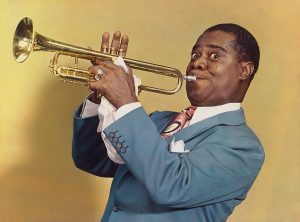Shiny Stockings
Count Basie
A tribute to the master of swing
Pianist and bandleader William James Basie was born August 21, 1904 in Red Bank, New Jersey.
He briefly played drums in a kid’s band before his mother gave him piano lessons.
Basie was encouraged early on by Fats Waller, who was playing organ for silent movies and gave the youngster a lot of tips on both piano and organ.
Basie played with several bands in New York and New Jersey, and toured with revues that played in theaters.
When one tour left him stranded in Kansas City in 1927, he liked what he saw and decided to become part of the city’s exciting music scene.
Basie was a member of Walter Page’s Blue Devils in 1928 before joining Bennie Moten’s Orchestra where he was the main pianist (even though Moten was himself a pianist) during 1929-35, making his first recordings with Moten.
When Moten unexpectedly died in 1935, Basie formed his own trio which was soon expanded to a large ensemble originally called the Barons Of Rhythm; he was called “Count” by a radio announcer and the name stuck.
Count Basie and his band were discovered by producer John Hammond who happened to hear one of the group’s radio broadcasts; Hammond soon made it possible for the group (which had to expand in a hurry) to debut in Chicago and New York where they began recording for the Decca label.
By then, Basie had pared his stride piano style down to the basics, playing the most with the least notes as part of an influential rhythm section with guitarist Freddie Green, bassist Walter Page and drummer Jo Jones that changed the sound of big bands.
Equally revolutionary was his light-toned tenor-saxophonist Lester Young; the early band also featured major soloists in trumpeters Buck Clayton and Harry “Sweets” Edison, trombonist Dickie Wells and tenor-saxophonist Herschel Evans.
The Count Basie band became famous as the most swinging orchestra during the Swing era, lasting until financial troubles caused its breakup in late-1949.
After leading a septet for a couple of years, Count Basie formed a new orchestra in 1952 that, while having a similar rhythm section, had more of a reliance on tight arrangements and featured more modern soloists including trumpeters Thad Jones and Joe Newman, and tenors Frank Foster and Frank Wess (who doubled on flute).
Known as a swinging institution, the second version of the Count Basie band has been together since 1952, even surviving its leader’s death in 1984 and still touring the world.
This film clip from 1981 has a spirited version of Frank Foster’s “Shiny Stockings” by the always-swinging Basie band.
-Scott Yanow
[tell-a-friend id=”1″ title=”Tell a friend”]





